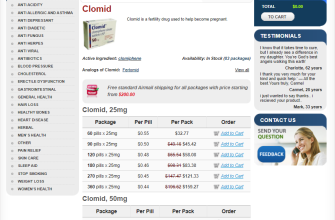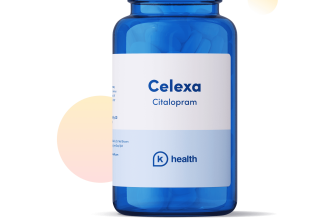Need Clomiphene Citrate 60 pills, 25mg each, without a prescription in the USA? We understand the need for convenient access to medication. This article directly addresses your search, providing clear, concise information. We will discuss the specifics of acquiring this medication, emphasizing the need for responsible usage and prioritizing your health.
Disclaimer: We strongly advise consulting a healthcare professional before using Clomiphene Citrate. This information is for educational purposes only and does not constitute medical advice. Self-medicating can be dangerous. Always prioritize a doctor’s evaluation to assess your individual needs and potential risks.
Finding legitimate sources for Clomiphene Citrate in the USA requires careful research. Many online pharmacies operate outside regulations. Thoroughly vet any potential supplier, checking for licensing and accreditation. Look for customer reviews and independent verification of their legitimacy. Remember, your health is paramount, and choosing a reputable source is key.
Important Note: The legality of purchasing Clomiphene Citrate without a prescription varies by state. Familiarize yourself with your local regulations before proceeding. Understanding the potential legal ramifications is crucial before making any purchase.
- Clomiphene Citrate: Understanding the Risks and Benefits
- Side Effects
- Benefits
- Understanding Clomiphene Citrate’s Mechanism of Action
- Increased Gonadotropin Release
- Ovulation Induction
- Important Considerations:
- Potential Side Effects:
- Potential Side Effects of Clomiphene Citrate
- Legal Implications of Buying Clomiphene Citrate Without a Prescription
- Potential Consequences
- Finding a Reputable Doctor for Clomiphene Citrate Prescription
- Safe and Effective Dosage of Clomiphene Citrate
- Monitoring and Adjustments
- Individualized Approach
- Side Effects and Considerations
- Alternative Treatments for Infertility
- Monitoring Your Health While Using Clomiphene Citrate
- Ovarian Hyperstimulation Syndrome (OHSS)
- Understanding Your Blood Tests
- Maintaining a Healthy Lifestyle
Clomiphene Citrate: Understanding the Risks and Benefits
Clomiphene citrate helps some women ovulate, increasing chances of pregnancy. However, it’s crucial to weigh potential side effects against benefits. Multiple pregnancies (twins, triplets, etc.) are a significant risk, occurring in approximately 5-10% of cases. This risk increases with higher doses and your age.
Side Effects
Common side effects include hot flashes, mood swings, headaches, and blurred vision. Less common, but serious, side effects include ovarian hyperstimulation syndrome (OHSS), which can cause severe abdominal pain and fluid buildup. Rarely, vision problems persist, requiring immediate medical attention. Before starting Clomiphene, discuss your medical history with your doctor, particularly regarding liver or blood clotting disorders. Regular monitoring of follicle growth and hormone levels is necessary during treatment.
Benefits
For women with anovulation (failure to release an egg), Clomiphene can restore ovulation in a significant percentage of cases. This allows for natural conception or assisted reproductive technologies (ART), like intrauterine insemination (IUI). The drug’s success rate varies based on the cause of infertility and patient response. While it doesn’t guarantee pregnancy, it provides a pathway to conception for many women experiencing fertility challenges.
Understanding Clomiphene Citrate’s Mechanism of Action
Clomiphene citrate works by binding to estrogen receptors in the hypothalamus and pituitary gland. This binding prevents estrogen from signaling effectively. This, in turn, tricks your body into thinking estrogen levels are low.
Increased Gonadotropin Release
The reduced estrogen signaling causes the hypothalamus to release more GnRH (gonadotropin-releasing hormone). This increased GnRH stimulates the pituitary gland to produce more follicle-stimulating hormone (FSH) and luteinizing hormone (LH).
- FSH promotes follicle growth in the ovaries, crucial for egg development.
- LH triggers ovulation, releasing the mature egg.
Ovulation Induction
The higher levels of FSH and LH directly result in the stimulation of ovarian follicle growth and maturation. Ultimately, this leads to the release of one or more mature eggs, increasing the chances of conception.
Important Considerations:
- Clomiphene citrate’s effect varies between individuals. Response depends on factors like age, ovarian reserve, and overall health.
- Monitoring follicle development and estrogen levels through blood tests and ultrasounds is standard practice during Clomiphene citrate treatment. This ensures optimal results and reduces risks.
- Multiple pregnancies are a potential side effect due to the possibility of multiple eggs being released.
Potential Side Effects:
- Hot flashes
- Mood changes
- Visual disturbances
- Ovarian enlargement
Always discuss potential risks and benefits with your physician before starting Clomiphene citrate treatment.
Potential Side Effects of Clomiphene Citrate
Clomiphene citrate, while effective for stimulating ovulation, can cause various side effects. These vary in severity and frequency, with some being more common than others.
Hot flashes are a frequent occurrence, often described as a sudden feeling of warmth spreading through the body. Many women experience mild discomfort, while others find them significantly bothersome. Managing this often involves lifestyle changes like dressing in layers and staying hydrated.
Ovarian enlargement is another possible side effect. This usually resolves on its own once treatment stops, but monitoring through ultrasound scans is typically recommended.
Visual disturbances, such as blurred vision or light sensitivity, can occur. These side effects are generally temporary and subside after treatment discontinuation. If you experience persistent vision problems, contact your doctor immediately.
Headaches are also common. Over-the-counter pain relievers may provide relief, but persistent or severe headaches require medical attention.
Nausea and vomiting can occur, though these are usually mild and manageable. Smaller, more frequent meals can often help alleviate these symptoms.
Multiple pregnancies are a potential risk with Clomiphene citrate. The likelihood increases with higher doses and longer treatment durations. This emphasizes the importance of careful monitoring and adherence to your doctor’s instructions.
Breast tenderness is a relatively common side effect, which usually diminishes once treatment concludes. Supportive bras may provide some comfort.
Remember, this list does not encompass all possible side effects. Always discuss any concerns or new symptoms with your healthcare provider.
Legal Implications of Buying Clomiphene Citrate Without a Prescription
Buying Clomiphene citrate without a prescription in the USA is illegal. The FDA regulates Clomiphene, and purchasing it without a prescription violates federal law. This can lead to significant penalties, including fines and even imprisonment.
Potential Consequences
Besides legal repercussions, buying unregulated Clomiphene carries health risks. Counterfeit medications are common, potentially containing incorrect dosages or harmful contaminants. Without medical supervision, you risk serious side effects and complications, particularly given Clomiphene’s impact on reproductive hormones.
Furthermore, obtaining accurate diagnosis and treatment for infertility requires a physician’s assessment. Self-medicating can delay proper diagnosis and treatment, potentially harming your chances of conception and overall reproductive health. Always consult a doctor for fertility concerns; they can provide safe and appropriate treatment options.
Finding a Reputable Doctor for Clomiphene Citrate Prescription
Begin your search with your primary care physician. They can perform an initial assessment and potentially prescribe Clomiphene Citrate, or refer you to a specialist.
Consider a Reproductive Endocrinologist. These specialists have extensive experience with fertility issues and are highly qualified to manage Clomiphene Citrate prescriptions and monitor your treatment.
Use online doctor directories like the American College of Obstetricians and Gynecologists (ACOG) or the American Society for Reproductive Medicine (ASRM) to locate board-certified physicians in your area.
Check physician reviews on websites such as Healthgrades or Vitals. Patient feedback offers valuable insights into a doctor’s communication style, bedside manner, and overall patient experience.
Schedule a consultation. During your visit, discuss your medical history, fertility goals, and any concerns you have regarding Clomiphene Citrate. A thorough discussion ensures you are well-informed and comfortable with the treatment plan.
Verify the doctor’s license and credentials with your state’s medical board to confirm their legitimacy and qualifications. This step is critical for ensuring your safety and well-being.
Remember that obtaining a prescription without a proper medical evaluation is risky. Prioritize your health and seek professional medical guidance.
Safe and Effective Dosage of Clomiphene Citrate
Clomiphene citrate treatment typically begins with a 50 mg daily dose for 5 days, starting on cycle day 3, 5, or 7 (depending on your doctor’s instructions). This regimen is often adjusted based on individual response.
Monitoring and Adjustments
Your doctor will closely monitor your response, including follicle development through ultrasound and hormone level checks. If ovulation doesn’t occur at the 50mg dose, your doctor may increase it to 100mg daily for 5 days. However, doses exceeding 150mg daily are generally not recommended due to increased risk of side effects.
Individualized Approach
Dosage is highly personalized. Factors like your age, medical history, and specific fertility challenges significantly influence the appropriate dose and treatment duration. Some women may ovulate at lower doses, while others may require higher doses or extended treatment. Always follow your doctor’s guidance.
Side Effects and Considerations
Common side effects include hot flashes, mood swings, and visual disturbances. These are usually mild and temporary. Severe side effects are rare but require immediate medical attention. Open communication with your doctor is key to managing any potential issues.
Alternative Treatments for Infertility
Consider lifestyle changes first. Maintaining a healthy weight through diet and exercise significantly improves fertility chances for both men and women. Regular exercise helps regulate hormones and improve overall health.
Acupuncture shows promise. Studies suggest it may improve blood flow to the reproductive organs and increase chances of conception. Consult a licensed acupuncturist experienced in fertility treatments.
- Dietary Adjustments: Focus on nutrient-rich foods. Incorporate antioxidants from berries, leafy greens, and nuts. Reduce processed foods, sugar, and caffeine.
- Stress Management: Chronic stress negatively impacts fertility. Explore relaxation techniques like yoga, meditation, or deep breathing exercises.
Herbal remedies offer potential, but proceed with caution. Some herbs, like chasteberry and maca root, show potential benefits, but always consult a healthcare provider before using them, especially if you are on other medications.
- Consult a Naturopathic Doctor: They can personalize a plan considering your specific health needs and may recommend specific herbal supplements or other natural therapies.
- Discuss Assisted Reproductive Technology (ART): Options like in-vitro fertilization (IVF) or intrauterine insemination (IUI) offer higher chances of pregnancy for some couples.
Remember, individual responses vary. What works for one person may not work for another. Open communication with your doctor is key to finding the best approach for your circumstances.
Monitoring Your Health While Using Clomiphene Citrate
Schedule regular appointments with your doctor. These visits allow for close monitoring of your treatment progress and address any potential side effects.
Track your basal body temperature (BBT). Daily BBT charting helps you identify ovulation and potential problems with your cycle. Use a BBT thermometer and record your temperature consistently each morning before getting out of bed. Consult your doctor to understand what your chart should look like.
Monitor for side effects. Common side effects include hot flashes, mood swings, headaches, and visual disturbances. Report any significant or concerning side effects to your doctor immediately. Don’t hesitate to communicate any changes in your health.
Ovarian Hyperstimulation Syndrome (OHSS)
OHSS is a serious complication of ovulation induction. Watch for symptoms like abdominal pain, bloating, nausea, and vomiting. Seek immediate medical attention if you experience these symptoms, particularly if they worsen rapidly.
Understanding Your Blood Tests
Your doctor will likely order blood tests to monitor your hormone levels and ovarian response. These tests provide valuable information about your treatment’s effectiveness and help manage potential risks. Ask your doctor to clarify any results you don’t understand.
| Symptom | Severity | Action |
|---|---|---|
| Hot flashes | Mild to moderate | Discuss with doctor; lifestyle adjustments may help |
| Severe abdominal pain | Severe | Seek immediate medical attention |
| Blurred vision | Any degree | Contact your doctor immediately |
Maintaining a Healthy Lifestyle
Maintain a balanced diet and engage in moderate exercise. These lifestyle choices support overall health and can positively influence treatment outcomes. Avoid excessive alcohol consumption and smoking.










